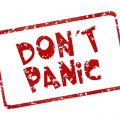Table of Contents
The symptoms of Anxiety Disorder can range from extreme or intense emotions, physical symptoms, or certain character behaviors. Below we present you with a checklist of the signs and symptoms of an Anxiety Disorder, grouped according to these three experiential levels.
Emotional Signs and Symptoms
- Irrational and crippling fear
- Excessive worrying
- Persistent self-doubt
- An intolerance of uncertainty
- Feelings of panic, fear and uneasiness
Physical Signs and Symptoms
- Insomnia or other forms of sleep problems, and sleep disorders such as frequent nightmares, restless leg syndrome, and bruxism (gnashing of teeth during sleep)
- Chronic pain, persistent and pervasive muscle tension, chest pains
- Gastrointestinal disorders, digestive problems, frequent urination, and Irritable Bowel Syndrome (IBS)
- Heart Disease or other forms of heart problems such as racing heartbeat and heart palpitations
- Respiratory problems and shortness of breath
- Allergic reactions
- Nausea and vomiting
- Chills, twitching, shaking, and hot flashes
- Dry mouth
- Dizziness and fainting spells
- Numbness or tingling in the hands and feet
Behavioral or Medical Signs and Symptoms
- Repeated panic attacks that are characterized by sudden and intense fear and helplessness, coupled with a racing heartbeat, sweating, dizziness, stomach pain, and breathing problems
- Extreme stage fright and self-consciousness in social situations as possible symptoms of Social Anxiety Disorder
- Sudden flashbacks to a traumatic memory or event in the past
- Extreme and debilitating perfectionism
- Rituals that are comprised of obsessive thoughts and compulsive behavior
- Restlessness and the inability to be still and calm
In addition to the signs and symptoms enumerated above, there are certain lifestyle and environmental factors that can also contribute to a person having an Anxiety Disorder. If you have experienced or are going through any of the following, there is a greater risk that what you are experiencing may already be classified as an Anxiety Disorder:
Contributory Factors:
- Substance and alcohol abuse
- Side effects of certain drugs such as those for high blood pressure, diabetes, and thyroid disorders
- Withdrawal symptoms due to cessation of drugs, alcohol, or any medication prescribed for anxiety and sleep disorders
- Exposure to persistent and ongoing stressful environmental factors at work, school, or at home, or a specific triggering event characterized by high stress






 I love to write medical education books. My books are written for everyone in an easy to read and understandable style.
I love to write medical education books. My books are written for everyone in an easy to read and understandable style.